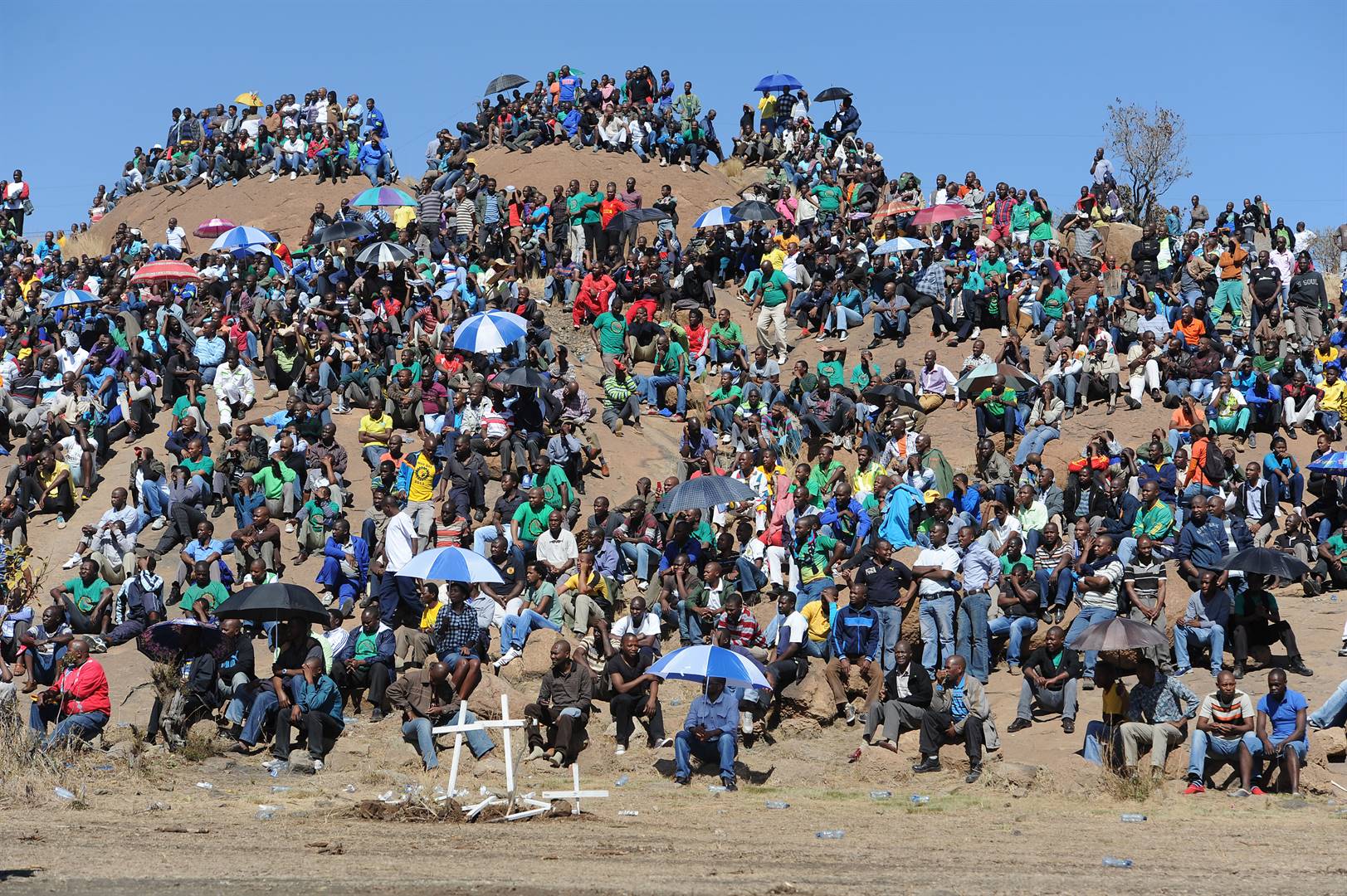
- The State's witness was in complete disagreement with statements read to him by the defence during cross examination.
- The statements revealed the wounds on one of the mineworkers were actually from being stabbed.
- But the witness did not want to comment on the statements.
A police officer testifying in the murder trial of former North West deputy police commissioner William Mpembe and five other cops was left with no words when statements were read to him by the defence during cross-examination on Thursday.
The statements read by defence lawyer Henko Scholtz revealed information he had not testified on, and with which he was disagreeing.
Lieutenant-Colonel Moses Mushwana is attached to the Local Criminal Records Centre (LCRC) and compiled forensic evidence and photographs of the scene where chaos erupted at Lonmin K3 shaft in Marikana - three days before the infamous massacre in August 2012.
Mpembe is on trial alongside former colleagues Salmon Vermaak, Nkosana Mguye, Collin Mogale, Joseph Sekgwetla and Khazamola Makhubela. All have pleaded not guilty to the charges they face.
Scholtz represents Mguye, Mogale, Sekgwetla and Makhubela.
News24 previously reported that retired police officer Rapheso Masinya testified about detailed video images, which showed blood spilt on the ground, bloodied bodies, two fatally injured police officers and three dead miners.
The deceased were later identified as Semi Jokansi, Phumzile Sokhanyile, Thembelakhe Mati, Hendrick Monene and Sello Lepaaku.
Scholtz's clients are being directly linked to mineworker Sokhanyile's death.
READ | Marikana murder trial: Defence questions cop on blood of deceased at crime scene
Scholtz focused his cross-examination on Sokhanyile's body.
The lawyer told the court he preferred referring to Sokhanyile as the deceased.
He read the first statement written by a police officer who had attended the scene. In the report, the officer describes finding the deceased dressed in a white overall and blue T-shirt, lying on the ground on his stomach on top of a panga and a knobkerrie.
The officer said he also observed a stab wound on the left side next to the deceased's neck, and another on the left cheek and at the back of his head.
The statement also mentions that 10 cartridge cases were seen from the side where the deceased was lying, and that the LCRC took it.
In the statement, the officer also mentions the deceased did not sustain any further injuries until he was taken by the mortuary vehicle.
Commenting on the contents of the statement read by Scholtz, Mushwana said he did not collect any cartridges cases next to the deceased, but at a different location.
"I want to put it to you that this witness observed that this deceased was stabbed," Scholtz said.
Mushwana replied that he had no comment because he had said nothing in his testimony about the stabbing and gunshot wound.
Scholtz also referred to another statement from a police officer, named "Mathe", who said: "There were also 10 cartridges, 15 metres from the deceased."
But Mushwana also disagreed with the statement.
ALSO READ | Marikana trial: Here's a summary of what happened in court this week
Scholtz said: "So you see, colonel, from my point of view, I'm having difficulty. I'm having a statement which a person says that he arrived before you on the scene and then found cartridges 15m from the deceased.
"My further difficulty is, you arrived 40 minutes later, and you found cartridges 74 metres [away from deceased].
"So, in short, here we have a member of SAPS directly stating that 10 cartridges were found within the proximity of the body."
Mushwana said the 74m he referred to was when he had just arrived at the scene.
Going back to the integrity and protection of the crime scene, Scholtz said he had a problem with the civilians seen at the scene in some of the pictures in the album submitted as evidence to the court.
Scholtz said it was even difficult to differentiate cops from civilians in the pictures.
In his defence, Mushwana replied: "I have already testified that my crime scene was not fully barricaded."
Scholtz said that his album was confusing and depicted some of the images as though they were taken on the same day.
"Now the problem that I'm personally having with your photo album is that there is absolutely no sequence of events and sequence of time in your photographs.
"Photos 1 to 13 create the picture that the scene of the deceased was together and then suddenly jumps to 9 October in photos 15 to 39, and then again you have 40 onwards which were taken on different dates. That creates uncertainty, sir, I want to put it to you."
Mushwana replied: "I do understand. I should have compiled two photo albums."
Scholtz continues with his cross-examination on Friday.
We know this was a long read and your time is precious. Did you know you can now listen to articles? Subscribe to News24 for access to this exciting feature and more.
